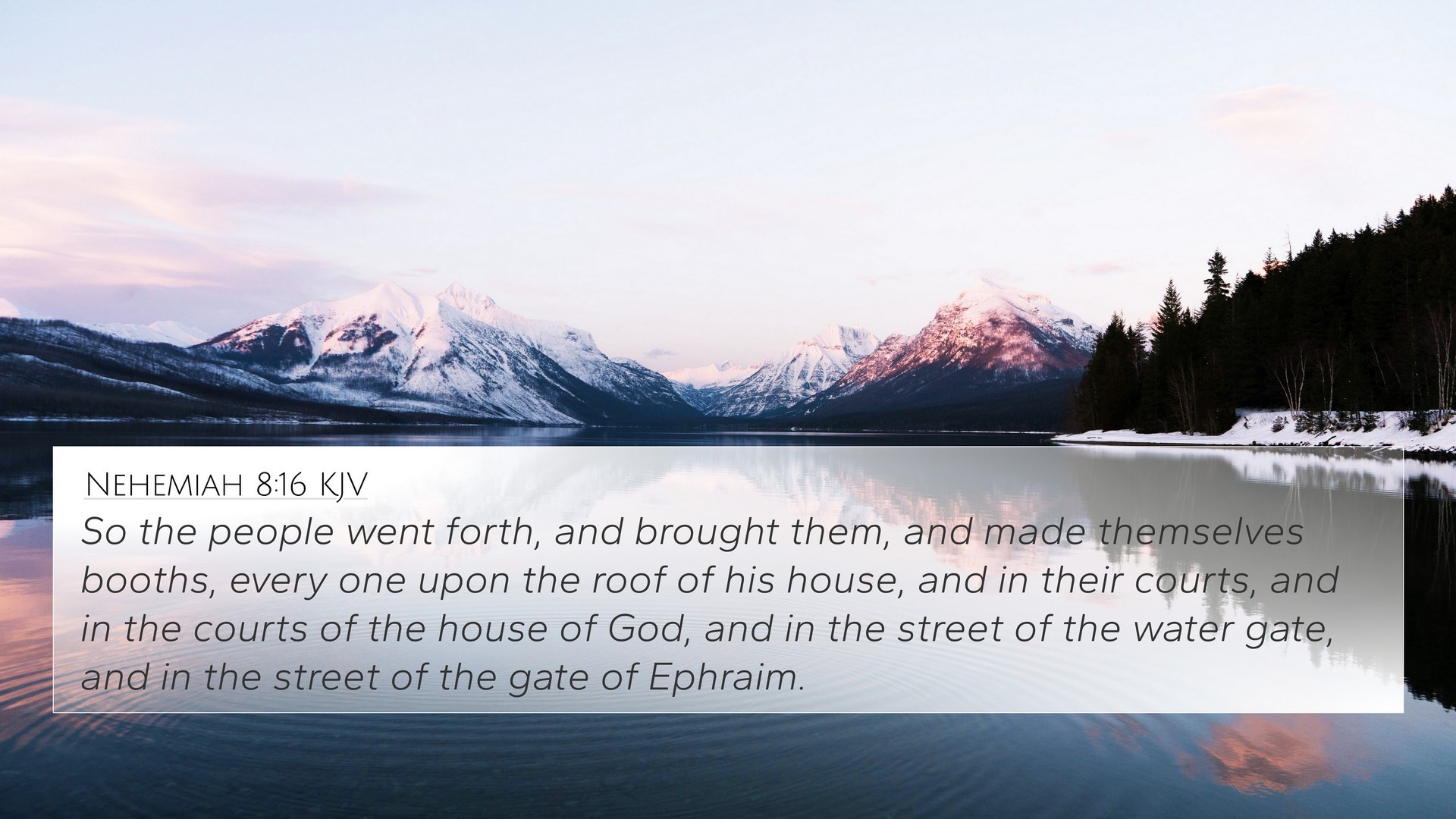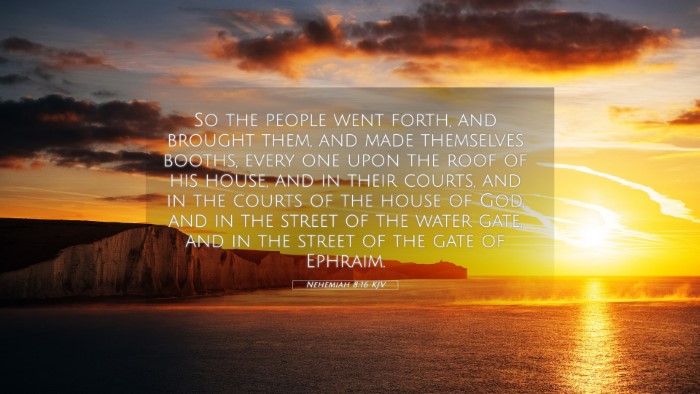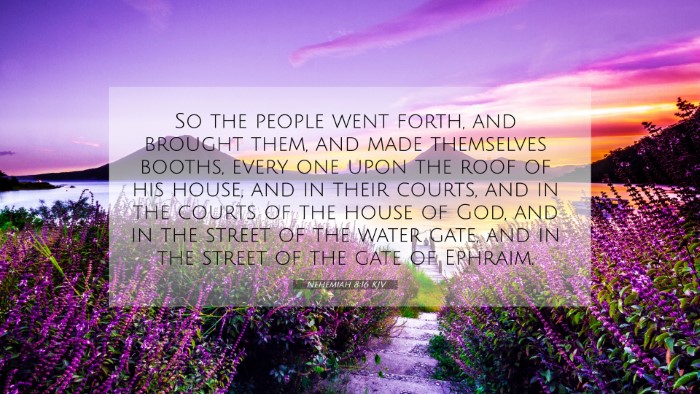Old Testament
Genesis Exodus Leviticus Numbers Deuteronomy Joshua Judges Ruth 1 Samuel 2 Samuel 1 Kings 2 Kings 1 Chronicles 2 Chronicles Ezra Nehemiah Esther Job Psalms Proverbs Ecclesiastes Song of Solomon Isaiah Jeremiah Lamentations Ezekiel Daniel Hosea Joel Amos Obadiah Jonah Micah Nahum Habakkuk Zephaniah Haggai Zechariah MalachiNehemiah 8:16 Similar Verses
Nehemiah 8:16 Cross References
So the people went forth, and brought them, and made themselves booths, every one upon the roof of his house, and in their courts, and in the courts of the house of God, and in the street of the water gate, and in the street of the gate of Ephraim.
Uncover the Rich Themes and Topics of This Bible Verse
Listed below are the Bible themes associated with Nehemiah 8:16. We invite you to explore each theme to gain deeper insights into the Scriptures.
Nehemiah 8:16 Cross Reference Verses
This section features a detailed cross-reference designed to enrich your understanding of the Scriptures. Below, you will find carefully selected verses that echo the themes and teachings related to Nehemiah 8:16 KJV. Click on any image to explore detailed analyses of related Bible verses and uncover deeper theological insights.
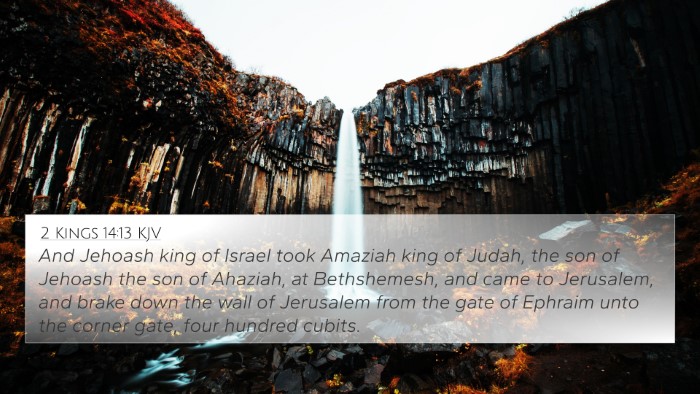
2 Kings 14:13 (KJV) »
And Jehoash king of Israel took Amaziah king of Judah, the son of Jehoash the son of Ahaziah, at Bethshemesh, and came to Jerusalem, and brake down the wall of Jerusalem from the gate of Ephraim unto the corner gate, four hundred cubits.
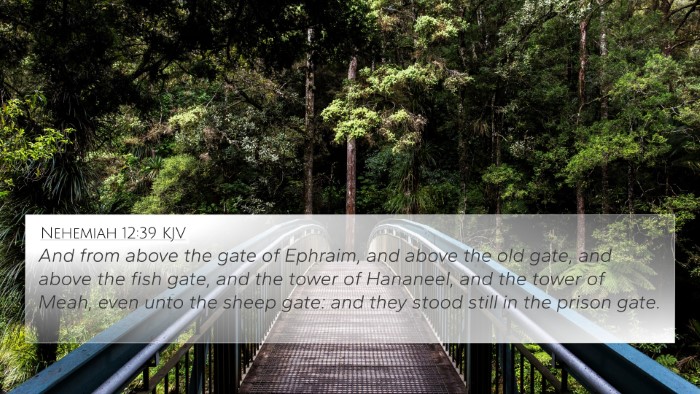
Nehemiah 12:39 (KJV) »
And from above the gate of Ephraim, and above the old gate, and above the fish gate, and the tower of Hananeel, and the tower of Meah, even unto the sheep gate: and they stood still in the prison gate.
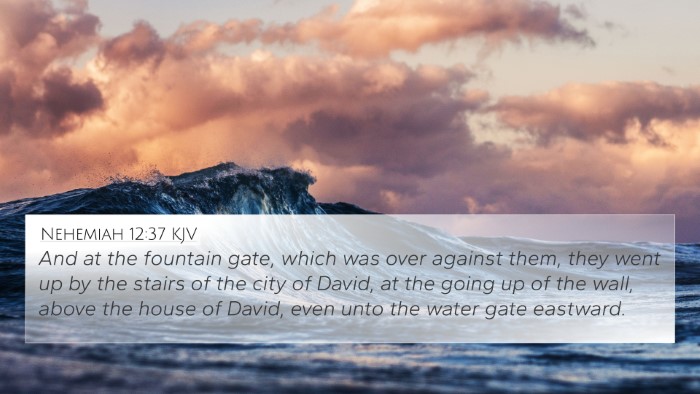
Nehemiah 12:37 (KJV) »
And at the fountain gate, which was over against them, they went up by the stairs of the city of David, at the going up of the wall, above the house of David, even unto the water gate eastward.
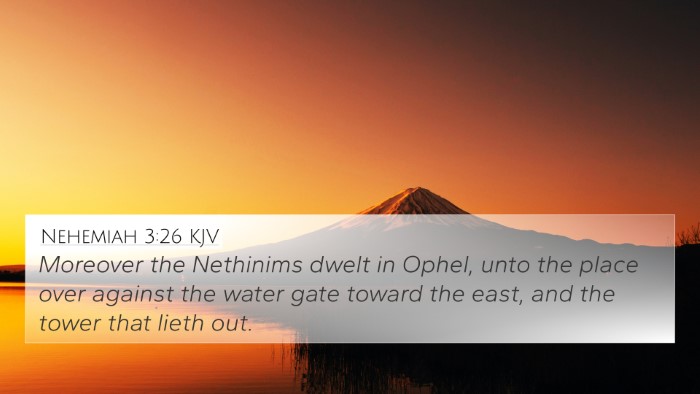
Nehemiah 3:26 (KJV) »
Moreover the Nethinims dwelt in Ophel, unto the place over against the water gate toward the east, and the tower that lieth out.
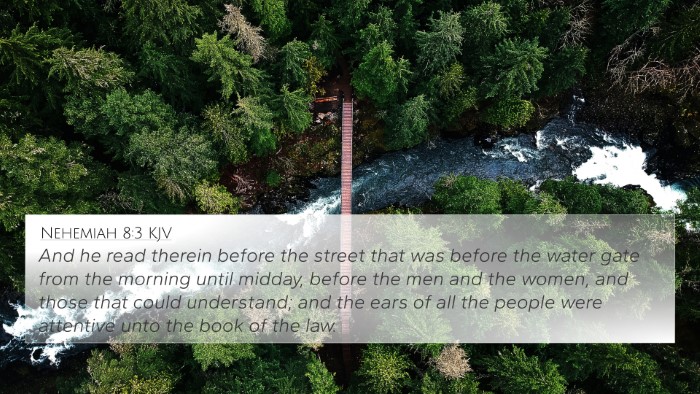
Nehemiah 8:3 (KJV) »
And he read therein before the street that was before the water gate from the morning until midday, before the men and the women, and those that could understand; and the ears of all the people were attentive unto the book of the law.
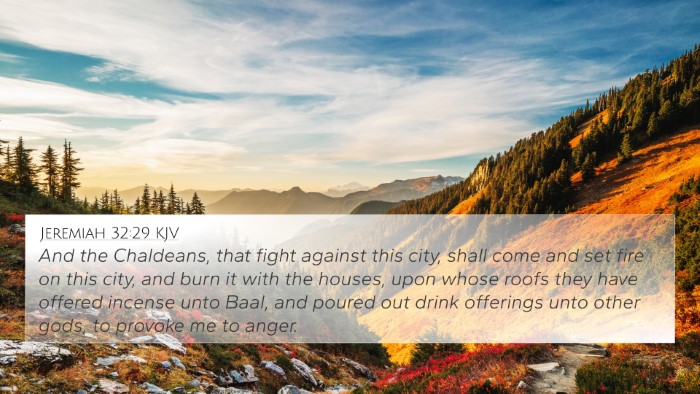
Jeremiah 32:29 (KJV) »
And the Chaldeans, that fight against this city, shall come and set fire on this city, and burn it with the houses, upon whose roofs they have offered incense unto Baal, and poured out drink offerings unto other gods, to provoke me to anger.

Deuteronomy 22:8 (KJV) »
When thou buildest a new house, then thou shalt make a battlement for thy roof, that thou bring not blood upon thine house, if any man fall from thence.
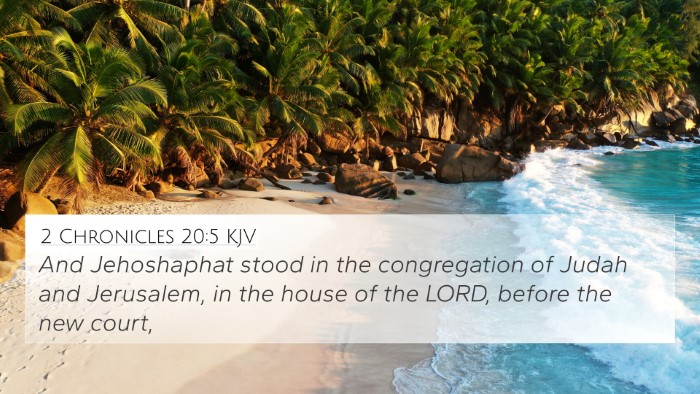
2 Chronicles 20:5 (KJV) »
And Jehoshaphat stood in the congregation of Judah and Jerusalem, in the house of the LORD, before the new court,
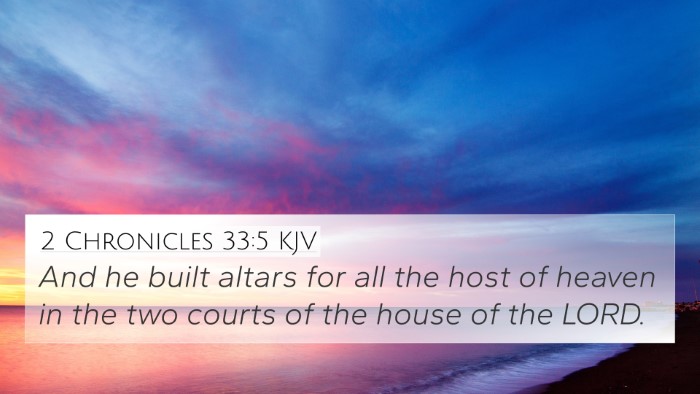
2 Chronicles 33:5 (KJV) »
And he built altars for all the host of heaven in the two courts of the house of the LORD.
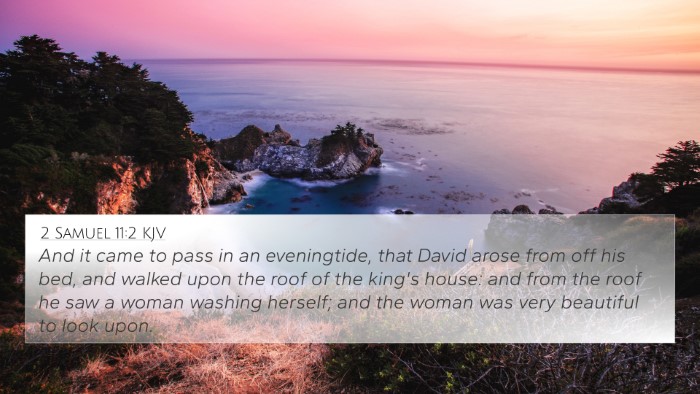
2 Samuel 11:2 (KJV) »
And it came to pass in an eveningtide, that David arose from off his bed, and walked upon the roof of the king's house: and from the roof he saw a woman washing herself; and the woman was very beautiful to look upon.

Jeremiah 19:13 (KJV) »
And the houses of Jerusalem, and the houses of the kings of Judah, shall be defiled as the place of Tophet, because of all the houses upon whose roofs they have burned incense unto all the host of heaven, and have poured out drink offerings unto other gods.
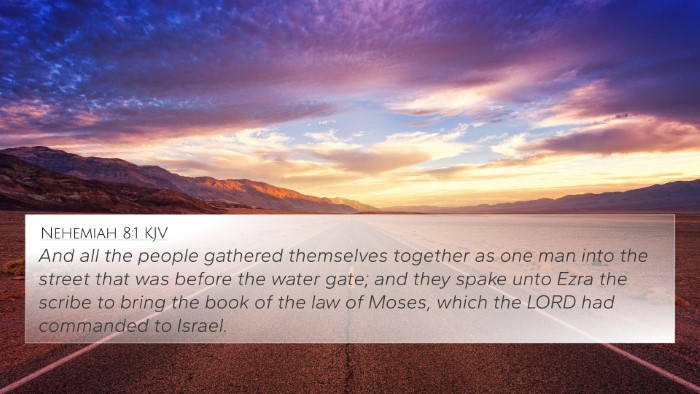
Nehemiah 8:1 (KJV) »
And all the people gathered themselves together as one man into the street that was before the water gate; and they spake unto Ezra the scribe to bring the book of the law of Moses, which the LORD had commanded to Israel.
Nehemiah 8:16 Verse Analysis and Similar Verses
Understanding Nehemiah 8:16
Bible Verse: Nehemiah 8:16 (NIV) - "So the people went out and brought back branches and built themselves booths on their own roofs, in their courtyards and in the courts of the house of God, on the square by the Water Gate and the one by the Gate of Ephraim."
Overview of Nehemiah 8:16
This verse encapsulates a significant moment in the history of the Israelites after their return from Babylonian exile. Following the reading of the Law, the people responded with joy and obedience, as they sought to celebrate the Feast of Tabernacles. This act of building booths signifies their desire to follow God's commandments and remember His provision. By understanding this verse, readers can gain insights into themes of obedience, community, and remembrance in the covenant relationship between God and His people.
Commentary Insights
Matthew Henry's Commentary
Matthew Henry emphasizes the communal aspect of the people’s actions in Nehemiah 8:16. He notes that the spontaneous response of the people to gather materials for booths reflects their joy and eagerness to follow God’s instructions. Henry points out that this was not merely individual zeal but a collective movement of the community to express gratitude towards God. The booths symbolize their pilgrimage and dependence on God for sustenance, recalling their wilderness experience.
Albert Barnes' Commentary
Albert Barnes highlights the significance of the booths as temporary shelters, which serves as a reminder of Israel’s dependence on God during their journey through the wilderness. He connects this event to God’s command in Leviticus 23:40, which instructs the Israelites to celebrate the Feast of Tabernacles by living in booths. Barnes clarifies that such observance fosters a sense of identity and spiritual reflection among the community, reinforcing the importance of remembering God’s past faithfulness.
Adam Clarke's Commentary
Adam Clarke provides a deeper context regarding the Feast of Tabernacles, stating its historical relevance to the Israelites. Clarke mentions that the celebration occurs during the harvest season and signifies a time of thanksgiving. He points out that building booths was an outward expression of unity and obedience. Clarke adds that the act of gathering in public spaces for worship and celebration showcases the fulfillment of God’s promise to His people, thus enhancing their communal bonds.
Thematic Connections and Cross-References
Nehemiah 8:16 draws attention to several key themes such as obedience, remembrance, and community celebration. Below are some pertinent Bible cross-references that shed light on these themes:
- Leviticus 23:33-44 - God’s command to observe the Feast of Tabernacles.
- Deuteronomy 16:13-15 - Instructions on celebrating the Feast of Tabernacles with joy and thanksgiving.
- John 7:2 - Mention of the Feast of Tabernacles in the New Testament context.
- Exodus 12:24-27 - Importance of remembering the Exodus, connecting it with the act of celebrating God’s deliverance.
- Psalm 118:1 - A call to give thanks to the Lord, resonating with the themes of gratitude found in Nehemiah.
- Isaiah 12:4-5 - A reminder to make known God’s deeds among the nations, paralleling the public declaration in Nehemiah.
- Hebrews 11:9-10 - Reference to the temporary dwellings of the patriarchs, similar to the booths in Nehemiah’s time.
- Malachi 1:14 - A call to honor God's name, reflecting the attitude of the Israelites in obedience and worship.
- Acts 2:46 - The early church gathering daily and sharing in communal meals, reflecting the unity expressed in Nehemiah 8:16.
- 1 Corinthians 10:16-17 - The unity of believers as one body corresponding with the communal aspect of the feast.
Applying Nehemiah 8:16 Today
Understanding Nehemiah 8:16 challenges believers today to reflect on their own communal worship and individual responses to God’s commands. The act of building booths highlights the importance of participating in shared faith experiences, gratitude towards God, and remembering His past faithfulness. Through integrating Nehemiah 8:16 into the contemporary faith journey, Christians can find renewed motivation to celebrate their faith actively and to engage with Scripture meaningfully.
Conclusion
Nehemiah 8:16 serves as a poignant reminder of the importance of community in worship and the joy of obedience to God’s Word. It invites believers to explore the connections between biblical texts, find parallels among the Scriptures, and deepen their understanding of God’s everlasting covenant. By actively engaging with such passages, individuals enrich their spiritual lives and foster a deeper relationship with God.
